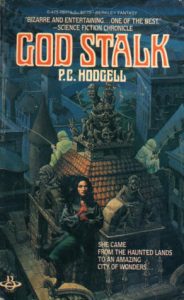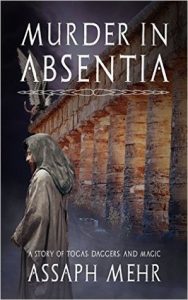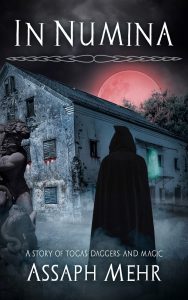Author Spotlight: Assaph Mehr
Assaph has been a bibliophile since he learnt to read at the age of five, and a Romanophile ever since he first got his hands on Asterix, way back in elementary school. This exacerbated when his parents took him on a trip to Rome and Italy – he whinged horribly when they dragged him to “yet another church with baby angels on the ceiling”, yet was happy to skip all day around ancient ruins and museums for Etruscan art.
He has since been feeding his addiction for books with stories of mystery and fantasy of all kinds. A few years ago he randomly picked a copy of a Lindsay Davis’ Marcus Didius Falco novel in a used book fair, and fell in love with Rome all over again, this time from the view-point of a cynical adult. His main influences in writing are Steven Saylor, Lindsey Davis, Barry Hughart and Boris Akunin.
Assaph now lives in Sydney, Australia with his wife, kids, cats, and – this being Australia – assorted spiders. By day he is a software product manager, bridging the gap between developers and users, and by night he’s writing – he seems to do his best writing after midnight. You can find Assaph on Twitter, Facebook, Goodreads, and his website.
Thanks for joining us today, Assaph. Let’s start small: tell us about a great book you’ve read recently!
I’m currently working my way through the Kencyrath Chronicles by P.C. Hodgell. I read the first book (God Stalk) when I was a kid and loved it. I had a couple of sequels (in hardcover) but missed the rest of this amazing series that came later, so now I’m rectifying that.
 I’d heartily recommend it to anyone who loves Epic Fantasy cycles done right: Hodgell’s story-telling and world-building are top-notch, the characterisation is without par, her story pacing is excellent, and she balances light and dark themes perfectly.
I’d heartily recommend it to anyone who loves Epic Fantasy cycles done right: Hodgell’s story-telling and world-building are top-notch, the characterisation is without par, her story pacing is excellent, and she balances light and dark themes perfectly.
Okay, time to escalate things: reality warps and you suddenly find yourself leading a D&D-style party through a monster-infested dungeon. What character class are you, and what’s your weapon of choice?
I always played either the wizard or the paladin. One of my favourite characters, though, was in Shadowrun – a troll decker. Nobody ever suspected me…
I’d say that just like my protagonist, I tend to go for the jack-of-all-trades, mixed class characters. As for weapons of choice, I train in Wing Chun so either twin short swords (aka butterfly swords) or the long spear.
When you’re not trawling through dungeons, do you prefer to type or to hand-write? Why?
Type, definitely type. I type faster than I write, and – as a bonus – it’s actually legible afterwards. I don’t do heavy editing during the first draft, but it’s still a lot easier to work on the computer, fix holes, change things, expand, redact, etc.
I sometime sketch hand-notes or maps as a way to brainstorm, but even that is on OneNote on the computer.
And how do you like to work – in silence, with music, or serenaded by the damned souls of a thousand dead shrimps?
Mmm, shrimps sound nice on the barbie (Sorry, I’m an Aussie ?). Generally, I prefer to write in quiet. I can deal with some noise in the background but having kids (Dad! Dad! Dad! DAD!) kinda kills any chance of creative concentration.
I write either late at night, or on the train commute to work. That’s when I get some uninterrupted time to just write. Also, the less internet, the better. I write in and around my daily life.
Are you an architect or a gardener? A plotter or a pantser? D’you write in your underwear, or in a deep-sea diver’s suit? Tell us something unusual about your writing method!
I call my writing way ‘plotsing’ – the perfect combination between planning and pantsing, given a bodily-noise theme.
Seriously, when I first sit down and start a novel or a short, I know where the story starts, where it ends, and a few highlights I want to hit along the way. In between there’s discovery writing, and everything can be fixed later in editing.
 What are your most significant non-book fantasy influences?
What are your most significant non-book fantasy influences?
80’s cult classics (from Princess Bride to The Evil Dead), years of D&D and other role-playing games, and an over-active imagination.
What was the last thing you watched on TV and why did you choose to watch it?
Whatever my wife chose to watch when I was around. Left to myself, I’d rather read.
Then again, what with the kids, I can quote most recent Disney and Pixar movies by heart. Trust me, though, watching Hotel Transylvania 37 times last week was not my free choice.
The world shifts, and you find yourself with an extra day on your hands during which you’re not allowed to write or otherwise do any work. How do you choose to spend the day?
If the family is there too – then spend it together, probably at some park. If I’m alone, then I’ll read.
If you could choose one punctuation mark to be made illegal, which would it be and why?
My approach to punctuation is to load a shotgun with it and spray the page. Let my editor sort them out.
In no more than three sentences, tell us a little something about your current work in progress!
The year’s senior consul came back from military campaign stark raving mad, and his co-consul doesn’t want to go down in history as the ‘year of the crazy consuls’. One name comes highly recommended for solving nutty cases. In a true Felix fashion, this is a story of Lunacy and Exile, of Piracy and Ghosts!
(This is going to be a free novella to anyone who joins my mailing list).
If you could co-write or co-create a series (like The Expanse, or the Malazan Book of the Fallen), who would you choose to work with and why?
Hm, not something I ever considered. My current stories tend to be a mix of what I like to read (ancient Rome, detectives, and urban fantasy). I have plenty of other ideas brewing in my feverish mind, but I find writing a solitary activity.
If I was collaborating, I’d love to do it with someone who’d both connect to my brand of lunacy, someone with whom I could spark ideas and get better writing done.
Or JK Rowling, GRRM, Gailman, Butcher, Sanderson, etc. Wouldn’t mind my name next to theirs on the cover.
What’s the most (and/or least) helpful piece of writing advice you’ve ever received?
The least helpful advice is the prescribed method that urges you to follow it as some key to success. It’s not. You need to put in the effort to find your own way.
That said, the best advice, one that you’ll hear from most authors, is rather simple:
If you want to write, write. Unless you get words on a page, you’re not going to get ahead with writing.
Now, if you want to write well, read. Read voraciously, in and out of your genres. Read critically. Read some more. And then write.
 If you could visit any country at any point in history, where/when would you go, and why?
If you could visit any country at any point in history, where/when would you go, and why?
Considering my writing blends ancient Rome with fantasy, I think that would be pretty obvious. I’d love to observe first hand some of the notable events throughout the two millennia from the pre-Roman eras to the end of the Byzantine period. I’d also love to come back with some long-lost books and works of arts. Sulla’s memoirs come to mind.
Every writer encounters stumbling blocks, be it a difficult chapter, challenging subject matter or just starting a new project. How do you motivate yourself on days when you don’t want to write?
Sometime it’s just a matter of getting the juices flowing, of putting word after slow word on the page, until it clicks and the pace picks back up.
Sometimes, the day’s a wash and I just read instead. I let my subconscious work on the problem, and try again the next day. I’m often surprised by the genius solutions my mind comes up with, and how it all falls neatly together.
Tell us about a book that’s excellent, but underappreciated or obscure.
Barry Hughart’s Bridge of Birds. It’s one of the best historical-fantasy novels out there. In a market populated by dark fantasy and horror detectives, this book stands unique in one important aspect – charm. It’s inspired (and inspiring) writing, an absolute pleasure to read. I keep re-reading it every few years, and every time it’s still just as good.
Finally, would you be so kind as to dazzle us with what we like to call a ‘shark elevator pitch’? (It’s exactly the same as an elevator pitch, but with sharks.) (Well, one shark. Which, by the way, is currently picking between its rows of teeth to try and dislodge the remains of the last author who stepped onto its elevator.)
Ahem. So: why should readers check out your work? A shark elevator pitch of your own book(s) in no more than three sentences – go!
Stories of Togas, Daggers, and Magic – for lovers of Ancient Rome and Dark Urban Fantasy. (Think Harry Dresden in a Toga ?).
If you love realistic and well-researched historical mysteries as well as supernatural fantasy, this is for you.
Thanks again for joining us, Assaph!
Assaph Mehr is the author of the Felix the Fox series, including MURDER IN ABSENTIA and IN NUMINA.

